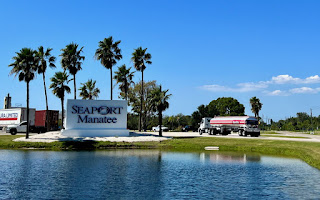I Was Mostly Wrong about Saying "the US has too many Ports"
Back shortly after the turn of the millenium I attended several transportation conferences and made a point of asking speakers if 'There are too many ports". I also, made some comments on various papers, presentations, etc. to that effect. I specifically used the example of Florida, which had 10 seaports and the Mississippi river, which had a number of River ports.
It seems I was wrong on the Florida issue, although maybe right on the Mississippi river issue. The reason I was wrong about Florida is that I did not foresee that extent to which the 10 ports could specialize so each would contribute enough economic benefit to justify the landside investment that Florida and the USA would have to make. Also, I did not foresee the extent to which the capacity of the west coast ports, specifically LA and Long Beach would be constrained by various policies that limited their operational efficiency. This capacity problem on the west coast has made the east coast ports more important and allowed significant divergence of traffic to them.
The image is the seaport of Manatee which is near the Tampa seaport on the west (Gulf) side of Florida. The port of Manatee has moved to specialize in fuel, wood products and fruit and vegetable products. The port had about a 35% increase in tonnage from 2021 to 2022. With respect to the Mississippi River ports, the ones on the lower Mississippi, e.g. New Orleans, Baton Rouge are obviously important and I never had a problem with those. However, up-river, there are a number of ports, e.g., Helena, AR, Tunica, MS that handle very little cargo and require a lot of public infrastructure investment to support them. Of course the poster child for inefficient ports are the one along the Tennesse - Tombigbee waterway where the public investment was higher than the 20 year value of cargo on the waterway.




Comments
Post a Comment